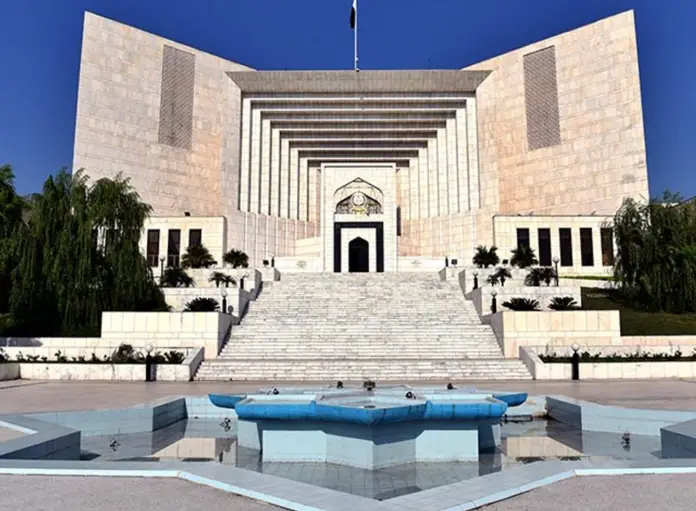The Supreme Court has restrained the Balochistan government from allotting land to the Pakistan Navy on a lease basis.
Last week, a division bench of the SC, led by Justice Jamal Khan Mandokhail, heard an appeal against the Balochistan High Court’s order wherein a citizens’ petition was rejected against the allotment of their land to the Pakistan Navy by the provincial government.
“The government of Balochistan is directed to ensure that citizens are not deprived of enjoying their fundamental rights, inter alia, guaranteed under Articles 23 and 24 of the Constitution,” read a four-page order authored by SC’s Justice Athar Minallah.
“The government of Balochistan is directed to ensure that no land is allotted in violation of Article 173 of the Constitution and the aforementioned laws,” it added
The SC further restrained the provincial government from “acting prejudicial to the rights of those citizens who have not been compensated nor their properties have been subjected to acquisition proceedings”. “Subject to [the] disposal of the petition, the federal and provincial governments are directed to ensure that the scheme of the Constitution and the applicable laws are not violated in case of allotment of land for the use of entities/departments under their control,” the order stated.
The land in question, situated in Koh-e-Imam Ward, Airport Ward and Shaheed Ward in the province’s Kech district, was allotted by the Board of Revenue senior member via a letter dated May 15, 2009.
The Pakistan Navy, one of the branches of the armed forces, had directly approached the revenue authorities for the allotment of the land. The petitioners had invoked the constitutional jurisdiction of the BHC.
They had asserted that without compensation, they and other inhabitants were being forcibly evicted to hand over the possession of their land according to the allotment.
The reports of the settlement authorities reproduced by the high court in its judgment affirmed that 4,286 acres were in possession of private citizens, who had not been compensated.
The BHC, however, refused to exercise its jurisdiction.
The apex court in its order noted that the tehsildar of the Settlement Circle, Turbat had submitted a report confirming the transfer of 242 acres and 500 acres owned by the provincial government in favour of Pakistan Navy in Mouza Shaheed Ward and Mouza Airport Ward respectively, while the final attestation of Koh-e-Imam Ward was awaited.
The SC bench noted that it appeared from the record that the remaining area had not been settled as yet.
“According to the report, Pakistan Navy has constructed buildings on the purportedly allotted/leased land. Mr Muhammad Akram, Secretary (Judicial and Revenue) Board Balochistan, has appeared in the court] along with the learned additional attorney general and the learned advocate general. In response to our repeated queries, they could not show the relevant law which authorises [the] Pakistan Navy to directly approach the revenue authorities for [the] allotment of land or empower the provincial government to allot or lease property vested in the provincial government,” the SC order read.
“Likewise, the provincial authorities are also not vested with the jurisdiction to allot land owned by the citizens without compensating them and that too in violation of the scheme of the Constitution of the Islamic Republic of Pakistan, 1973,” it added.
The SC noted that the Balochistan government had, prima facie, made the allotment in violation of the scheme of the Constitution and the applicable laws.
“The acts/omissions of the government of Balochistan, particularly allotment of land without compensating the citizens, gravely affects the fundamental rights guaranteed, inter alia, under Articles 23 and 24 of the Constitution,” it observed.
The SC, while granting leave to appeal, has posed seven questions for adjudication.
The court questioned whether or not the BHC was justified in refusing to exercise its jurisdiction under Article 199 of the Constitution when sufficient material had been placed on record to show that the provincial government, without compensating the citizens, had allotted the disputed land.
It also posed the query of whether or not the Pakistan Navy was competent to directly approach the provincial revenue authorities for the allotment of land measuring more than 10,000 acres.
The order also questioned whether or not the Pakistan Navy had complied with the code regulating the construction of building.
The SC bench would adjudicate these questions on the next the date of hearing.







